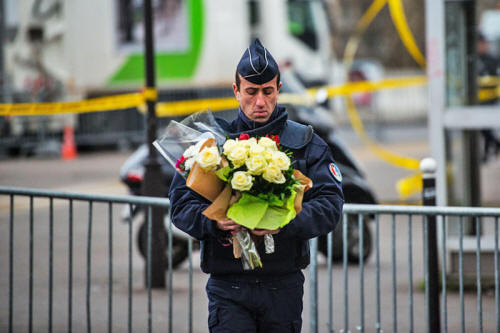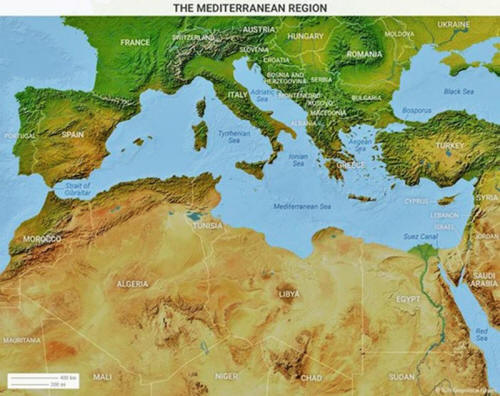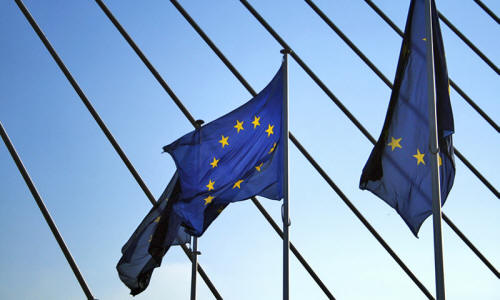|

by George Friedman
August 22, 2016
from
MauldinEconomics Website

Any discussion of Islamist terrorism in Europe and
the refugee crisis has to be placed
in a broader historical context.
One way to approach this is to think
about the Mediterranean Sea, which was central to the Roman Empire.
The Romans occupied both shores of the Mediterranean and created a
single integrated political and economic system around it. As the
Roman Empire declined, the system fractured.
The general outcome was that,
Over time, both extended beyond the
Mediterranean basin.
-
Christianity extended to the
east (into Russia) and north of the Alps (into Germany,
Britain, and Scandinavia
-
Islam extended south (deeper
into Africa) and east (into the Indian Ocean basin and the
South China Sea)
But the Mediterranean remained the
center of gravity and the flash point of their relationship, as
it is today.

The Early
Years of Christianity and Islam
The fourth century was a critical time for Christianity.
Constantine converted to
Christianity and declared Byzantium (today's Istanbul) the new Rome.
His ascent was bloody, and he used Christianity to hold together the
remnants of the Roman Empire.
One reason that he chose Byzantium as
his seat was to try to control the northern and southern shores of
the Mediterranean under one set of beliefs.
From the beginning, Christianity was both a religion and a
political force, though never united into a single
entity. It was divided into regional churches with different
doctrines.
The primordial split was between the
Roman church and the Orthodox churches of the east.
Muhammed founded Islam about 300 years later on the Arabian
Peninsula. Islam was a political religion as well,
uniting the faithful and the empire. Islam surged eastward into
Persia and westward into the southern shore of the Mediterranean,
where it supplanted most of the fragmented Christian regions.
Then a few centuries after Muhammed's death, Islam fragmented
into,
-
the Shiite regions of Persia and
the Euphrates valley
-
the Sunni regions in the west,
the southern Mediterranean in particular
Conquering
Lands across the Sea
One of the most important sea lanes in the Mediterranean connected
Tunisia and Sicily.
The main land routes were along the
eastern Mediterranean (through today's Israel and Lebanon) into
Christian Turkey. Another route was in the west, across the narrow
Strait of Gibraltar (from today's Morocco to the Iberian Peninsula).
By the early 700s, Muslims crossed into Spain. They began a conquest
that was not ended by the Christians until the 1400s. The Muslims,
having consolidated their control of Spain, pressed across the
Pyrenees Mountains and moved toward the English Channel.
Running on extended supply lines, they
were defeated by forces under Charles Martel, grandfather of
Charlemagne.
That defeat put Islam on the defensive, fighting to hold Iberia. The
advantage shifted to the Christians. Beginning in the 11th
century, the Europeans launched a series of wars designed to force
the Muslims back to the southeast.
After the Crusades failed to hold the
land bridge from Turkey to Egypt, the initiative shifted to the
Muslims.
The Ottomans attacked and seized Constantinople in the 15th
century.
They proceeded to push northwest into
Europe through a combination of direct combat and alliances with
Christians at war with other Christians. They pushed west into the
Mediterranean in collaboration with Venice.
The Ottomans and allies controlled the Balkans, seized Budapest, and
drove west to Vienna, where they were defeated.
Still, they controlled parts of the
Balkans until after World War I, and the Muslim populations of
Bosnia and Albania are remnants of their presence.
Wars Continue
in the Modern Era
In the 19th century, the initiative swung back to
the Europeans with attacks on North Africa.
The French seized Algeria in 1827 and
Tunisia in 1881. The British dominated Egypt in 1882 and then built
the Suez Canal.
After World War I and the collapse of the Ottoman Empire,
-
Britain directly or indirectly
dominated the Arabian Peninsula, Iraq, and Palestine
-
The French held Lebanon and
Syria
-
Most important, the Europeans
collectively dominated the entire Mediterranean Basin - for
the first time returning to the geopolitics of ancient Rome.

When France and Italy were defeated and the British deeply weakened
in World War II, the Europeans lost control of North Africa. They no
longer had the power to control the region.
After the United States blocked a British-French-Israeli attempt to
keep control of the Suez Canal in 1956, the Europeans ceased to be a
factor in the southern Mediterranean Basin. But even without the
Suez affair, the French and British were finished.
The United States' only real interest
was in blocking the Soviet Union and taking over the British concern
for Arabian oil.
The British defeat of the Ottoman Empire in World War I fragmented
the heart of the Muslim World. That fragmentation gave way to
massive disorder after the European mutual destruction in World War
II.
Since then, the initiative has been shifting back to the Muslims. At
first, they continued to behave as if Europe still dominated them.
Then, they became caught up in the Cold War, manipulating the
Americans and Soviets.
After the collapse of the Soviet Union, the underlying realities of
the Islamic world began to re-emerge, just as the realities of
southeastern Europe had re-emerged when the Ottomans weakened.
The Islamic
World's Resurgence Today
The Muslim world is still chaotic.
Minimal American and Russian forces are
struggling to maintain some sort of order in the eastern
Mediterranean. However, the forces are trivial compared to the
enormity of the situation.
This is one of the periodic shifts that take place between Islam and
Christianity - between North Africa and the eastern Mediterranean on
one side and Europe on the other.
And for nearly 500 years, the Muslim
advantage has been their control of Istanbul.
We are seeing a massive population movement triggered by the chaos
in the Muslim world. The unrest comes from the collapse of European
power in the region. It also stems from the conflict inherent in
reconstructing regional political structures and dealing with
internal battles.
The current turmoil is no different than the chaos in the Balkans
that continued long after the Ottomans left. Such matters can take
many decades or even centuries to sort out.
The terrorist attacks in Europe are also part of this process.
Various strands of Islam are battling, and the battle will spill
over into Europe, as it has for over a thousand years.
Just as European quarrels have spilled
over into North Africa.
The Thousand
Years' War
European unity was perhaps greatest when the Turks were at the gates
of Vienna and southeastern Europe was under their heel.
North Africa was most stable when the
Europeans dominated it.
But the Europeans lack the strength and will to dominate North
Africa, and the Muslims are capable of only pinprick attacks, called
terrorism. The Ottoman occupation of Europe lasted four centuries,
as did the Christian Crusades.
The Mediterranean basin is not a place
where things are settled quickly.
There is talk of a long war, lasting decades. This is a long war
that has lasted 1,300 years. But it has not been simply war. There's
been economic cooperation, cross-religious political alliances, and
enough complex corruption to fill many books.
It is an intimate relationship, bound together by the Mediterranean
Sea. It is also a bad relationship, with both sides seeing
themselves as the victim.
It is important to bear in mind the similarities between the two
sides of the Mediterranean. Both Christianity and Islam are
political religions, combining internal conflict with foreign
adventures. Both are committed to their own beliefs and the
falsehood of others.
Yet the two sides of the Mediterranean traded, made alliances across
religious lines, and fought each other bitterly.
Each feared the other.
For Muslims, the memories of the
Crusades still generate fear.
For the Christians, there is a
prayer going back to the Ottoman era and a visit by a comet:
"Lord Save us from the Devil,
the Turk and the Comet."
Obviously, what I've laid out is an
oversimplification of history, but it's intended to show the
interconnections.
I am not making the case that
understanding the other side will lead to peace.
On the contrary, I am reminding readers of the constancy of the
conflict between Christianity and Islam. And in any conflict,
understanding both yourself and the other is the key to survival.
This is one of the oldest wars still active in the world - the war
between the northern and southern shores of the Mediterranean. It
was old when Hannibal left Carthage to go north and overthrow
the Romans, and the Romans came back to destroy Carthage.
Nothing about this is new, and both sides have given as good as they
got. But we are in a period when the initiative is shifting - this
time away from Europe to the Muslim world.
Europe has lost its grip on North Africa
and the Levant, and the first population movements and small attacks
are occurring.
It will not stay this way...
|




